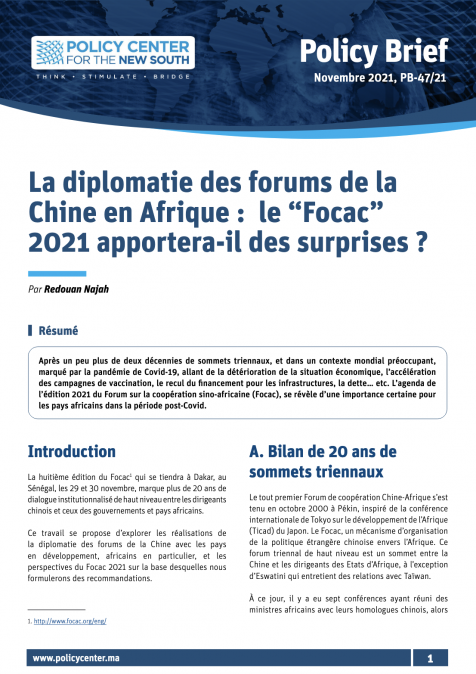Thirty years after its first democratic election, South Africa is heading towards a pivotal moment in its political history. Over 27 million citizens have registered to participate in this month’s general elections to elect 400 members of the National Assembly who will appoint the next head of state. Anticipation mounts as the ruling African National Congress faces the prospect of losing its dominance for the first time since 1994. PCNS explores the implications of these elections.
RELATED CONTENT
-
Virginie Collombier, Noamane CherkaouiDecember 03, 2021With elections in one month, Libya faces a multidimensional crisis. There is widespread disagreement with how the electoral process has transpired, which may set it up for rejection irres ...
-
AuthorsDominique LecompteThierry VircoulonNovember 26, 2021Bien qu’il soit assez largement passé inaperçu en France, l’accord signé le 3 décembre 2020 entre l’Union européenne (UE) et l’Organisation des États d’Afrique, des Caraïbes et du Pacifique (ACP) représente un virage important dans les relations anciennes entre l’UE et les pays du Sud. Cette dernière a développé une politique d’aide dès le Traité de Rome en 1957, a signé le premier accord de coopération en 1963 et est aujourd’hui souvent le premier bailleur de ces pays, notamment en ...
-
AuthorsNovember 26, 2021Après un peu plus de deux décennies de sommets triennaux, et dans un contexte mondial préoccupant, marqué par la pandémie de Covid-19, allant de la détérioration de la situation économique, l’accélération des campagnes de vaccination, le recul du financement pour les infrastructures, la dette... etc. L’agenda de l’édition 2021 du Forum sur la coopération sino-africaine (Focac), se révèle d’une importance certaine pour les pays africains dans la période post-Covid. ...
-
 AuthorsNovember 15, 2021Hisham Aidi chose a diplomatic version for fading freedom, growing populism, mental torture, perversion of truth and imprisonment- turning his Policy Brief "Covid-19 and Digital Repression in Africa" to "democratic retrenchment" and "imperial overreach". No mention of George Orwell's "Science fiction "oeuvre, of which George Parker wrote in "The Atlantic" ( July 2019°): "No novel of the past century has had more influence than George Orwell's "1984". Possibly Aidi did not detect an ...
AuthorsNovember 15, 2021Hisham Aidi chose a diplomatic version for fading freedom, growing populism, mental torture, perversion of truth and imprisonment- turning his Policy Brief "Covid-19 and Digital Repression in Africa" to "democratic retrenchment" and "imperial overreach". No mention of George Orwell's "Science fiction "oeuvre, of which George Parker wrote in "The Atlantic" ( July 2019°): "No novel of the past century has had more influence than George Orwell's "1984". Possibly Aidi did not detect an ... -
October 29, 202114h00 – 15h00: Session II - L’Indo-Pacifique : contours et enjeux Panel 3 : Contours géoéconomiques et géopolitiques Modérateur: Jamal Machrouh, Senior Fellow, Policy Center for the New South Intervenants: - L’AUKUS - Amiral Alain Oudot de Dainville, Ancien Chef d’État-Major de la Mar...
-
October 29, 202109h00 – 09h15 Mots d’ouverture Karim El Aynaoui, Président Exécutif, Policy Center for the New South Pascal Chaigneau, Directeur du Centre HEC de Géopolitique 09h15 – 10h15 : Session I - L’impuissance de la puissance Panel 1 : L’Afghanistan, un sanctuaire pour les djihadistes ? Modéra...
-
AuthorsNoamane CherkaouiOctober 26, 2021The democratic transition in Libya may be in peril because of an escalating, multidimensional crisis in the country. The crisis’ internationalized nature has undermined domestic stability, with many countries vying for influence and the spoils of war. These rivalries have seeped into an election process that was originally envisaged to be a method for attaining legitimacy. Instead, it is in danger of being hijacked, which would consolidate division and increase the risks of relapse ...
-
 AuthorsAbdessalam JaldiOctober 12, 2021The role played by diasporas in international relations should not be neglected. Bilateral engagements between states can be significantly affected by the practical and perspective relations between the diaspora community and their homeland. In the African context, none has been so deeply incorporated into the economic and social fabric of the continent as the Indian diaspora. Historically symbolized by Gandhi’s emblematic sojourn in South Africa and the participation of Indian inde ...
AuthorsAbdessalam JaldiOctober 12, 2021The role played by diasporas in international relations should not be neglected. Bilateral engagements between states can be significantly affected by the practical and perspective relations between the diaspora community and their homeland. In the African context, none has been so deeply incorporated into the economic and social fabric of the continent as the Indian diaspora. Historically symbolized by Gandhi’s emblematic sojourn in South Africa and the participation of Indian inde ... -
 AuthorsSeptember 30, 2021Les faits ont été largement relayés par la presse : le mardi 28 septembre, le porte-parole du gouvernement français, Gabriel Attal, confirmait sur le plateau de la chaine de télévision Europe 1 la décision de réduire « drastiquement » le nombre de visas accordés aux citoyens des pays du Maghreb (pour la Tunisie un 30% et pour le Maroc et l’Algérie du 50% par rapport aux chiffres de 2020, déjà très bas à cause de la pandémie). Le porte-parole a expliqué cette déci ...
AuthorsSeptember 30, 2021Les faits ont été largement relayés par la presse : le mardi 28 septembre, le porte-parole du gouvernement français, Gabriel Attal, confirmait sur le plateau de la chaine de télévision Europe 1 la décision de réduire « drastiquement » le nombre de visas accordés aux citoyens des pays du Maghreb (pour la Tunisie un 30% et pour le Maroc et l’Algérie du 50% par rapport aux chiffres de 2020, déjà très bas à cause de la pandémie). Le porte-parole a expliqué cette déci ... -
 AuthorsSeptember 7, 2021Le 24 août 2021, le Ministre algérien des Affaires étrangères a convoqué une conférence de presse pour annoncer la rupture des relations diplomatiques avec le Maroc, avec effet immédiat. Cette décision, d’essence unilatérale, diffère de la rupture qui découle d’une décision adoptée par le Conseil de sécurité dans le cadre du Chapitre 7 de la Charte des Nations unies. En effet, dans le cas des pays qui font l’objet de sanctions, comme l’Afrique du Sud du temps de l’apartheid, le Cons ...
AuthorsSeptember 7, 2021Le 24 août 2021, le Ministre algérien des Affaires étrangères a convoqué une conférence de presse pour annoncer la rupture des relations diplomatiques avec le Maroc, avec effet immédiat. Cette décision, d’essence unilatérale, diffère de la rupture qui découle d’une décision adoptée par le Conseil de sécurité dans le cadre du Chapitre 7 de la Charte des Nations unies. En effet, dans le cas des pays qui font l’objet de sanctions, comme l’Afrique du Sud du temps de l’apartheid, le Cons ...






